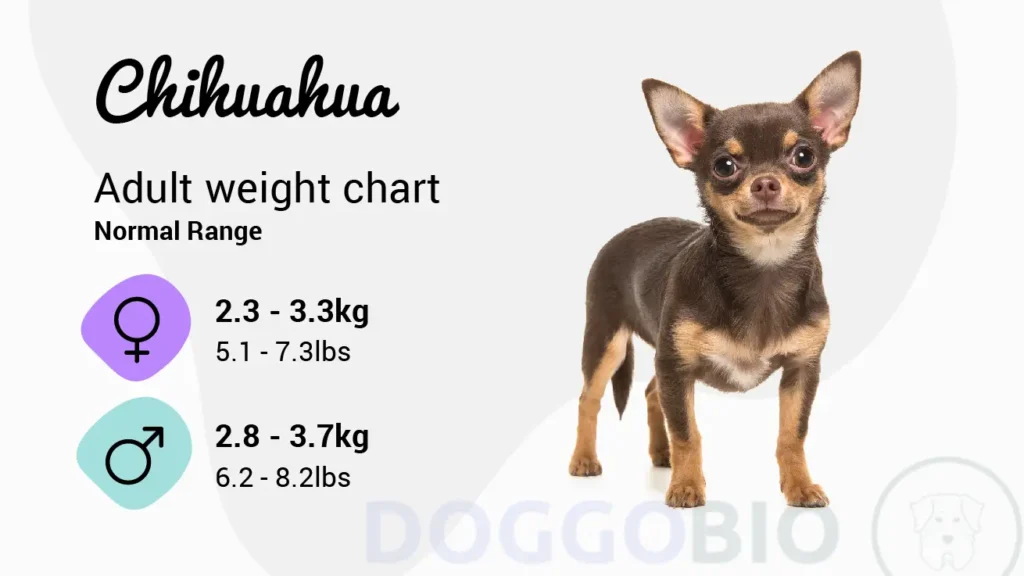Welcome to the comprehensive guide on dog health and the “Chihuahua Growth Chart.” Whether you’re a proud owner, a breeder, or someone considering bringing this charming breed into your home, understanding the growth and developmental stages of these tiny yet spirited dogs is essential.
This guide will delve into the intricate journey of a Chihuahua’s growth, from the earliest days as a fragile pup to the mature stages of adulthood. By exploring the milestones, physical changes, and care requirements that mark each phase, you will be better equipped to provide your puppy with the nurturing environment they need to thrive.
Join us as we chart the fascinating course of a Chihuahua’s growth and help you ensure a happy and healthy life for your pint-sized companion.
Chihuahua Growth Chart
| Age of Chihuahua Puppy | Weight in Ounces (Oz) | |||||||||
| Birth | 2.5 | 2.75 | 3 | 3.5 | 4 | 4.25 | 4.5 | 5 | 5.5 | |
| 1 week | 3.75 | 4 | 5 | 5.5 | 6.5 | 7 | 8 | 9 | 9.5 | |
| 2 weeks | 5 | 5.5 | 6.5 | 7 | 9 | 10 | 11 | 12.5 | 13.5 | |
| 3 weeks | 6 | 7 | 8 | 9 | 11 | 13 | 14 | 16 | 17.5 | |
| 4 weeks | 7 | 8 | 9.5 | 11 | 13 | 15 | 17 | 19.5 | 21 | |
| 5 weeks | 8 | 9 | 11 | 13 | 15 | 17 | 19.5 | 22 | 24 | |
| 6 weeks | 9 | 11 | 12.5 | 15 | 17.5 | 20 | 22 | 24 | 27 | |
| 7 weeks | 10 | 12 | 14.5 | 17 | 19.5 | 22 | 24.5 | 27 | 30 | |
| 8 weeks | 11 | 13 | 16 | 19 | 21.5 | 24 | 27 | 29 | 33 | |
| 9 weeks | 12 | 15 | 17.5 | 20 | 23 | 26 | 29 | 32 | 35 | |
| 10 weeks | 13 | 16 | 19 | 22 | 25 | 28 | 31 | 34 | 38 | |
| 11 weeks | 14 | 17 | 21 | 24 | 27 | 31 | 34 | 37 | 42 | |
| 12 weeks | 15 | 19 | 22 | 26 | 30 | 33 | 37 | 41 | 45 | |
| 13 weeks | 16 | 20 | 24 | 28 | 32 | 36 | 40 | 44 | 49 | |
| 14 weeks | 17 | 22 | 26 | 30 | 34 | 39 | 43 | 47 | 52 | |
| 15 weeks | 19 | 23 | 28 | 32 | 37 | 41 | 46 | 51 | 56 | |
| 16 weeks | 20 | 25 | 30 | 34 | 39 | 44 | 49 | 54 | 59 | |
| 17 weeks | 21 | 26 | 31 | 36 | 41 | 46 | 51 | 57 | 62 | |
| 18 weeks | 22 | 28 | 33 | 37 | 43 | 48 | 54 | 60 | 65 | |
| 19 weeks | 23 | 29 | 34 | 39 | 44 | 50 | 56 | 62 | 67 | |
| 20 weeks | 24 | 30 | 35 | 41 | 46 | 52 | 58 | 64 | 70 | |
| Estimated Adult Weight in Pounds (lbs) | 2lbs | 2.5 lbs | 3lbs | 3.5lbs | 4lbs | 4.5lbs | 5lbs | 5.5lbs | 6lbs | |
Why Do I Need To Know The Size Of My Puppy?

Knowing the size of your Chihuahua puppy is essential for several reasons. It helps you to provide the right amount of nutrition, avoid over-exercising, and monitor for potential health issues. The parents’ size plays a significant role in the puppy’s size, but nutrition and health conditions can have a substantial impact.
- Understanding your puppy’s projected size can also help you prepare for the space they will need, the size of the crate you should buy, and how much food you need to purchase.
- It can also help you understand what to expect regarding their exercise needs and how big of a space you will need to keep them happy and healthy.
- Knowing your puppy’s size can also help you anticipate potential health issues common in small or large dogs and discuss these with your vet.
What Can Affect The Size Of A Chihuahua?
The size of a Chihuahua is influenced by genetics, nutrition, exercise, and underlying health conditions.
- For example, over-exercising can affect the growth plates in their legs, potentially leading to abnormal growth.
- Nutrition plays a pivotal role; a well-balanced diet can promote healthy growth, while malnutrition can lead to stunted growth and health issues.
- Genetics are also a significant factor; the size of a Chihuahua’s parents often indicates how big a puppy will get, although there are no guarantees.
- Environmental factors, such as how much exercise a puppy gets and its diet, can also play a role. Stress and illness during critical growth periods can also affect a dog’s size. Regular vet check-ups during puppyhood are essential to ensure that your puppy is growing at a healthy rate.
- It’s also necessary to consider spaying or neutering, which can affect a dog’s growth and development.
Stages of Chihuahua Maturity

1. Infancy: 0 to 1 month
During this stage, your dog is a newborn entirely dependent on its mother. Newborn Chihuahuas are tiny, weighing 2.5 to 5.5 ounces and measuring 3 to 4 inches. They spend most of their time sleeping and nursing, allowing rapid growth.
2. Puppyhood: 4 weeks to 1 year
- Young puppy: 1 to 5 months
During this phase, Chihuahuas experience rapid growth. They start exploring their surroundings, and their baby teeth emerge. By the end of three months, they would have reached about 30% of their adult weight.
- Older puppies or adolescents: 6 to 12 months
Growth begins to slow down during this period. By 9 months, most Chihuahuas would have reached their adult height, approximately 5.9 to 9.1 inches. They continue to fill out but should only gain significant weight within this point.
3. Adulthood: 2 to 9 years
- Young adult: 2 to 3 years
This is the period immediately after the dog stops growing. They are at their peak health and physical form during these years.
- Full adult: 4 to 9 years
By this stage, the Chihuahua is middle-aged. They remain active but may show signs of aging as they approach their senior years.
4. Senior age: 10 years and above
Senior Chihuahuas, especially those over 10 years old, show signs of aging. They may experience health issues like dental problems, arthritis, and joint problems.
At What Age Do Chihuahuas Grow The Most?
Chihuahuas grow most from when they are brought to their permanent home (around 8-12 weeks) to around 5-6 months old. During this period, they may go through various growth spurts. This is a critical time for a puppy, as the foundation for their adult size and health is laid.
- Proper nutrition is essential during this period, as is appropriate exercise.
- Too much exercise can harm a dog’s developing joints, while too little can lead to obesity.
- It’s also a time of significant cognitive development, and positive, gentle training during this period can set up for a lifetime of good behavior.
- Socialization is also crucial during this period; Chihuahuas are known for their bold and sometimes aggressive nature, and early socialization can help to mitigate these traits.
When Do Chihuahuas Stop Growing?
Chihuahuas usually reach their adult weight between 9-12 months of age. They can continue to grow slightly beyond 12 months until approximately 18 months, often described as ‘filling out.’
This ‘filling out’ phase is when a Chihuahua’s body becomes more muscular and toned, and they lose their puppyish appearance.

Owners need to continue monitoring their dog’s weight and overall health during this period, as it’s a time when many dogs can become overweight if their diet and exercise aren’t adjusted to match their slowing metabolism.
Regular vet check-ups are essential during this period to ensure that everything is progressing as it should be and to catch any potential health issues before they become serious problems.
It’s also a time when all dogs, can benefit from continued training and socialization as they transition from puppyhood to adulthood.
How Do I Monitor Chihuahua’s Growth At Home?
You can monitor your Chihuahua’s growth at home by weighing them regularly.
This can be done by considering yourself, then holding your puppy and calculating the difference, or using a dedicated dog weighing scale.
Monitoring isn’t just about weight; it’s also about watching for signs of healthy development.
- Are they playful and active?
- Are their coat and eyes shiny and bright?
- Are they eating and drinking as they should be?
- Keeping a growth chart or journal can be a helpful tool.
It’s also an excellent practice to take regular photos of your dog from various angles, which can help you to track their development and spot any potential issues visually.
What To Do If Chihuahua Is Underweight?
If your Chihuahua is underweight, it is essential to consult with a vet. They could have an underlying illness causing them to lose weight or fail to thrive. Having your puppy on high-quality puppy food is crucial to encourage healthy growth.
- An underweight Chihuahua can be at risk for various health problems, including a weakened immune system and developmental issues. Your vet may recommend a special diet to help your puppy gain weight and will likely want to do some tests to rule out serious health issues like parasites, diabetes, or thyroid issues.
- Following your vet’s advice closely and carefully monitoring progress is essential. Sudden weight loss or the inability to gain weight despite adequate feeding can be signs of a severe health issue that needs immediate attention.
- It’s also essential to ensure that you puppy is receiving the right balance of nutrients, as simply increasing their caloric intake without regard for the quality of the food can lead to other health issues.
Vet Visits For Growth

Regular vet visits are essential for monitoring your dog’s growth and overall health. Your vet can provide valuable advice on nutrition, exercise, and any potential health issues affecting your puppy’s growth.
- These visits are more than just a chance to track your dog’s size; they are an opportunity for your vet to check for signs of potential health issues, such as dental, heart, and joint problems.
- Regular vet visits are also a chance to discuss your Chihuahua’s diet and exercise routine and to get vaccinations and parasite preventatives that are key to keeping your puppy healthy.
- Having a good relationship with your vet and feeling comfortable asking questions about your dog’s health and care is essential.
Frequently Asked Questions
What Is A Healthy Weight For A Chihuahua In Kg?
A healthy weight for a Chihuahua can vary, but generally, they should weigh between 1.13 to 2.04 kg (2.5-4.5 lbs).
This range is based on the breed standard, and individual dogs may vary. It’s essential to consult with a vet about your Chihuahua’s ideal weight, as factors like build, metabolism, and activity level can all affect what is healthy for an individual dog.
It’s also important to remember that they can be prone to obesity, so regular weight checks and adjustments to diet and exercise are essential.
How To Help An Obese Chihuahua Lose Weight?
Consult a vet with a weight loss plan, including a calorie-controlled diet and regular exercise. Weight loss in dogs, like in humans, is generally achieved through reducing caloric intake and increasing physical activity.
However, it’s important to approach weight loss in a healthy, sustainable way and under the guidance of a vet to ensure that your puppy remains healthy throughout the process. Your vet can help set a realistic weight loss goal and timeline and monitor your Chihuahua’s health to ensure they lose weight healthily and sustainably.
How Long Does It Take For A Chihuahua To Mature?
Chihuahuas usually reach their adult weight between 9-12 months but can continue to ‘fill out’ until about 18 months.
How Much Should A 4-month-old Chihuahua Weigh?
This can vary, but according to the chart in the article, a 4-month-old Chihuahua might weigh between 1.36 to 2.72 kg (3 to 6 lbs), depending on various factors.
How Old Is A Chihuahua To Be Adopted?
Understanding the appropriate age to adopt or purchase a Chihuahua is crucial. Removing them from their mothers too early can lead to health and behavioral issues.
It’s recommended to wait until they are at least 8 weeks old, ensuring they have had the essential early nurturing.
Is 10 Pounds Heavy For A Chihuahua?
Yes, 10 pounds is considered heavy for a Chihuahua. Typically, Chihuahuas weigh between two and six pounds when fully grown.
Is My Chihuahua Overweight Or Obese?
Determining if your Chihuahua is overweight or obese requires a combination of visual assessment and physical examination. Here are some signs to look for:
- Rib Check: You should be able to feel your Chihuahua’s ribs without pressing hard, but they shouldn’t be visibly protruding.
- Waistline: When viewed from above, your puppy should have a noticeable waist behind the ribs.
- Tummy Check: From a side view, your Chihuahua’s belly should tuck up, not hang down.
If you’re concerned about your Chihuahua’s weight, it’s essential to consult with a veterinarian. They can guide a suitable diet, exercise regimen, and underlying health issues.
How Many Puppies Can A Chihuahua Have?
A pregnant Chihuahua can typically give birth to a litter size ranging from 2 to 5 puppies for her first time. Nonetheless, the exact number can be influenced by factors such as the Chihuahua’s age, health status, and genetic background.
Conclusion
In conclusion, the journey through the Chihuahua Growth Chart highlights the incredible transformation these tiny dogs undergo from birth to adulthood.
Owners can ensure a healthy and thriving companion by tending to their specific needs and milestones, from fragility to vitality. Remember that the growth chart is a guide, and individual Chihuahuas may have their own pace of development.
By providing love, proper care, and attention to both physical and emotional growth, you’re embarking on a rewarding journey of companionship that will last a lifetime.

Pingback: Fat Chihuahua: A Guide to Healthy Weight Management 2024
Pingback: Pregnant Chihuahua: Tips For A Healthy Journey 2024